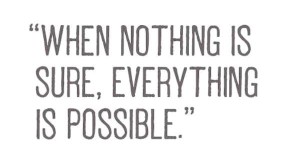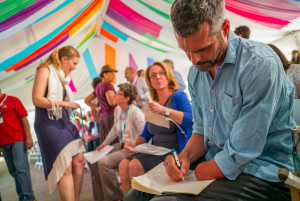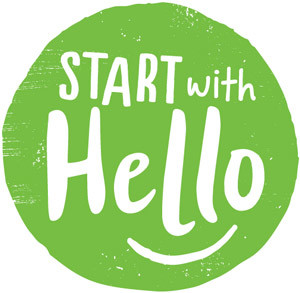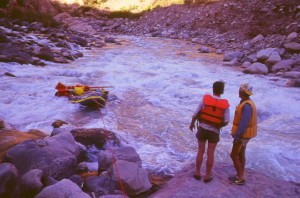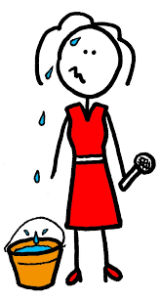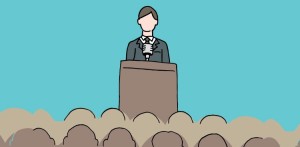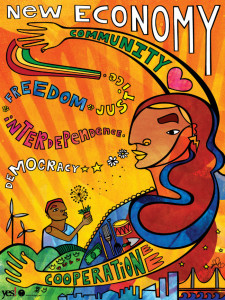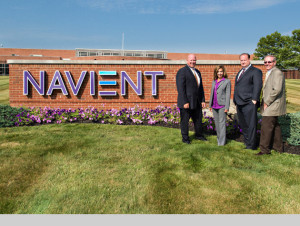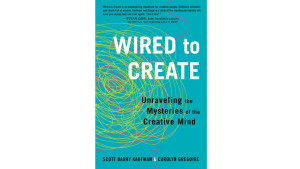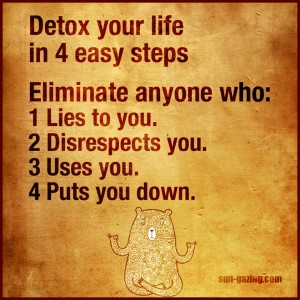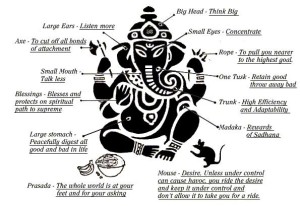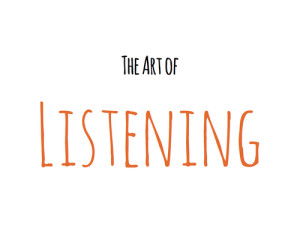‘Real power belongs to those who control the economy.’
January 31, 2016‘We mistakenly believe that capitalism begets inevitably democracy. It doesn’t.’
TED
“Have you wondered why politicians aren’t what they used to be, why governments seem unable to solve real problems? Economist Yanis Varoufakis, the former Minister of Finance for Greece, says that it’s because you can be in politics today but not be in power — because real power now belongs to those who control the economy. He believes that the mega-rich and corporations are cannibalizing the political sphere, causing financial crisis. In this talk, hear his dream for a world in which capital and labor no longer struggle against each other, “one that is simultaneously libertarian, Marxist and Keynesian.”
‘…not a lack of imagination.’
January 30, 2016On Being
“Let death be what takes us, not a lack of imagination.” As a palliative care physician, Dr. B.J. Miller brings a design sensibility to the matter of living until we die. And he’s largely redesigned his sense of own physical presence after an accident at college left him without both of his legs and part of one arm. He offers a transformative reframing on our imperfect bodies, the ways we move through the world, and all that we don’t control.”
Contradictions of White Privilege
January 29, 2016‘This Song Is Uncomfortable’
“White Privilege II”
Ben Haggerty/Macklemore: I was in Seattle. And it starts there. It starts with that moment of observing police brutality happening, again, with no accountability — and me stepping into a protest with a lot of baggage, feeling out of protest shape, when there’s this moment of injustice and I am feeling so compelled that I need to do something, yet also stepping into that space in my own head of, “Should be here? Is there something that I’m going to get called out for, being here? Am I going to distract more than actually do any good by being present here?” And all of these questions that I had.
Jamila Woods: Yeah, I think hearing that verse was one of the most intriguing parts of the song to me. The protests I’ve attended, I’ve seen and experienced some tension between white activists, or even [just] white people attending protests, who don’t necessarily have a moment of introspection — who maybe are just taking up airtime, you know, destroying things or just doing things that are distracting from what the protest is actually for. To me, I feel like it’s an important thing not to just consider yourself an ally by showing up, but to really investigate what your role can be in a productive way. And that comes from authentically engaging with the people — the black people — who are leading the protest.
For Profit Colleges and the GI Bill
NPR
Recent government sanctions against predatory for-profit colleges that preyed on veterans by using inflated job promises have opened the window on the wider challenges of helping veterans transition from service to higher education.
[…]
More than 1 million veterans and their families are taking advantage of the Post-9/11 GI Bill to attend college. But thousands are still attracted to for-profit schools. Are they aiming high enough? Are for-profits really the best fit for those who served?
http://www.npr.org/sections/ed/2016/01/29/464579497/veterans-to-higher-ed-big-room-for-improvement
Sandy Hook – Start with Hello.
January 28, 2016‘Social isolation is the overwhelming feeling of being left out, lonely, or treated like you are invisible. As a result, many further pull away from society, struggle with learning and social development and/or choose to hurt themselves or others. Start With Hello teaches students, grades 2-12, the skills they need to reach out to and include those who may be dealing with chronic social isolation and create a culture of inclusion and connectedness within their school or youth organization.’
Sandy Hook Promise:
An unconventional life.
January 14, 2016And committed to adventure.
‘Today, the fascinating Scott Hartman is here to tell us about his experience of rafting an unmapped river in Peru.’
Unconventional Interview: White Water Rafting on an Unmapped River in Peru with Scott Hartman
Just a little practice.
January 13, 20167 Simple Exercises That’ll Up Your Public Speaking Game
Short news cycles.
Let us take pause and remember the brilliance and contribution. And may we share our gratitude for their art and light while they still live among us.
Love’s such an old-fashioned word
and love dares you to care for
the people on the edge of the night
And love dares you to change our way
Of caring about ourselves
This is our last dance
This is our last dance
This is ourselves
☆
January 10, 2016Transformative Economy
‘…the new economy is not about ‘projects’ existing alongside the current unjust system—but about working toward transformative change for all.’
Ruh Roh.
January 8, 2016Until Thursday, Navient stock had never closed below book value. A year ago, Navient traded at twice its book value.
More than 12 million student loan borrowers, or about one in four, have a relationship with Navient, making it the nation’s largest student loan specialist. The company, formerly known as Sallie Mae, also is a major U.S. Department of Education contractor.
Navient shares have plunged 53 percent over the past year, and are down about 40 percent since the company spun off from Sallie Mae in 2014 and began trading independently.
Patricia Christel, a Navient spokeswoman, didn’t respond to a request for comment.
The company is contending with a variety of woes, from a possible lawsuit from the federal Consumer Financial Protection Bureau over allegations it cheated student loan borrowers, to investors’ concerns that the company will struggle to meet its obligations.
http://www.huffingtonpost.com/entry/navient-student-loans_568edd6ce4b0a2b6fb6f6486
daydreaming to creativity.
January 6, 2016There’s a Wrong Way to Daydream—Here’s How to Do It Right
A study by those Harvard researchers found that mind wandering consumed an average of 47 percent of people’s waking hours. This begs the question: If mind wandering is so costly to our well-being, then why in the world are we so willing to spend nearly half of our lives in this mental state?
Creative thinkers know, despite what their parents and teachers might have told them, that daydreaming is hardly a waste of time. But unfortunately, many students learn to suppress their natural instincts to dream and imagine—instead, they’re taught to fit into a standardized mold and to learn by the book, in a way that may not feel natural and that very well may suppress their innate desire to create. But as two prominent psychologists recently noted, “Not all minds who wander are lost” —in fact, the mind’s wandering is vital to imagination and creative thought.
Nearly 50 years ago, psychologist Jerome L. Singer established that daydreaming is a normal and indeed widespread aspect of human experience. He found that many people are “happy daydreamers” who enjoy their inner imagery and fantasy. According to Singer, these daydreamers “simply value and enjoy their private experiences, are willing to risk wasting a certain amount of time on them, but also can apparently use them for effective planning and for self-amusement during periods of monotonous task activity or boredom.”
Singer coined the term “positive-constructive daydreaming” to describe this type of mind wandering, which he distinguished from poor attention and anxious, obsessive fantasies. By making these important distinctions, Singer was able to highlight the positive, adaptive role that daydreaming can play in our daily lives, under the right circumstances. From the beginning of his research, he found evidence that daydreaming, imagination and fantasy are related to creativity, storytelling and even the ability to delay gratification.
Of course, mind wandering can be costly when it comes at the wrong time, especially in regard to things like reading comprehension, sustained attention, memory and academic performance. The inability to control your attention when the task at hand requires it often leads to frustration, just as the tendency to get wrapped up in distracting negative thoughts can lead to unhappiness. But when we consider the fact that most of our important life goals lie far into the future, it’s easier to see how daydreaming might be beneficial. When our inner monologues are directed toward and measured against goals, aspirations and dreams that are personally meaningful, the benefits of daydreaming become much more clear.
Over the past decade, scientists have employed newer methodologies to investigate these potential benefits. In a review of the latest science of daydreaming, Scott and colleague Rebecca McMillan noted that mind wandering offers very personal rewards, including creative incubation, self-awareness, future-planning, reflection on the meaning of one’s experiences and even compassion.
Take creative incubation, for starters. Many of us know from experience that our best ideas come seemingly out of the blue when our minds are off wandering elsewhere. Idle though it may seem, the act of mind wandering is often anything but mindless. Research suggests that an incubation period of mind wandering leads to improvements in creative thinking. The next time you’re working hard on a creative project or work assignment that requires intense focus and creative chops, try taking a five-minute daydreaming break every hour or so, and see how it affects your ideas and thinking. During this break, engage in a simple activity that will allow your mind to wander, like walking, doodling or cleaning. Consider this our creative incubation period and see if you feel a renewed sense of creative energy when you get back to work.
With meditation, the most common way of practicing mindfulness, recently exploding in popularity, we’re told increasingly to focus on the here and now, whether we’re in the shower, on our commute or sitting in the lotus pose for our morning meditation. So where does that leave daydreaming?
There seems to be a tension between mindfulness, which emphasizes the stilling of the thoughts to cultivate a quiet, peaceful mind, and daydreaming—or “spontaneous mental time travel,” as some psychologists have referred to it—which encourages us to let any and all of our thoughts roam free, sometimes, yes, at the expense of being fully aware of our present surroundings. How can the benefits of mind wandering, which beckons us to disconnect from our surroundings, be reconciled with the many mental health and cognitive benefits of mindfulness?
While there are a number of distinct creative benefits associated with mindfulness, being distracted isn’t always a bad thing. As University of California, Santa Barbara, researchers noted in a recent report, a balance between external-directed focus and a free-flowing inward attention may be our natural state.
“Consciousness is continuously moving with ever-changing content, but also ebbs like a breaking wave, outwardly expanding and then inwardly retreating,” the researchers write.
Successful innovators are often adept in harnessing both of these important mental states as their creative process calls for them. A connection to our inner selves and our stream of consciousness is undeniably what makes us creative. We all have the potential to become artists precisely because we dream. We should allow ourselves to balance the focused mind with the wandering mind, and skilled daydreamers do this naturally. Research has found that those whose daydreams are most positive and most specific also score high in mindfulness.
It may be wise, then, to question whether we should always be living in the moment and whether this is the best way to foster creative thinking. Finding this “middle way” between mindfulness and mind wandering can help us enjoy optimal benefits of both ways of thinking. Mindfulness helps us truly see what’s around us—a skill of paramount importance in life and art—but it must be balanced with giving the mind space to dream, fantasize,and simply roam free.
From WIRED TO CREATE: Unraveling the Mysteries of the Creative Mind, by Scott Barry Kaufman and Carolyn Gregoire, published by Perigee, an imprint of Penguin Publishing Group, a division of Penguin Random House LLC. Copyright � 2015 by Scott Barry Kaufman and Carolyn Gregoire.
Read more: http://www.oprah.com/health/The-Right-Way-to-Daydream#ixzz3wUzwrcp3
To be on your own.
‘And say do you want to make a deal? How does it feel? To be on your own. With no direction home. A complete unknown.’
-Bob Dylan
And, from Seth Godin:
‘There are millions of college seniors beginning their job search in earnest.
And many of them are using the skills they’ve been rewarded for in the past:
Writing applications
Being judged on visible metrics
Showing up at the official (placement) office
Doing well on the assignments
Paying attention to deadlines, but waiting until the last minute, why not
Getting picked
Fitting in
The thing is, whether you’re a newly graduating senior (in hundreds of thousands of dollars of debt) or a middle-aged, experienced knowledge worker looking for a new job, what the best gigs want to know is:
Can you show me a history of generous, talented, extraordinary side projects?
Have you ever been so passionate about your work that you’ve gone in through the side door?
Are you an expert at something that actually generates value?
Have you connected with leaders in the field in moments when you weren’t actually looking for a job?
Does your reputation speak for itself?
Where online can I see the trail of magic you regularly create?
None of these things are particularly difficult to learn, if you are willing to be not very good at them before you’re good at them.
Alas, famous colleges and the industrial-education process rarely bother to encourage this.’
School of Lost Borders
The biggest gift you can give is to be absolutely present, and when you’re worrying about whether you’re hopeful or hopeless or pessimistic or optimistic, who cares? The main thing is that you’re showing up, that you’re here and that you’re finding ever more capacity to love this world because it will not be healed without that.
~Joanna Macy
Communication…wisdom from Ganesh.
January 3, 2016¿Qué dijiste?
“When listening to another person, don’t just listen with your mind, listen with your whole body. Feel the energy field of your inner body as you listen.That takes attention away from thinking and creates a still space that enables you to truly listen without the mind interfering. You are giving the other person space-space to be. It is the most precious gift you can give.“
-Eckhart Tolle
